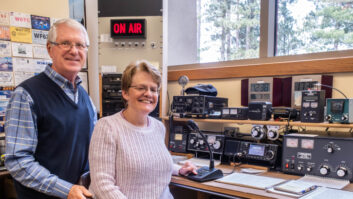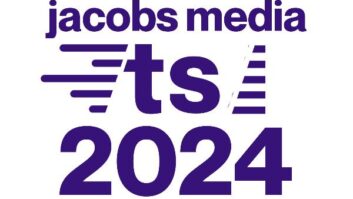It was 1995 when KING(FM) of Seattle first took its classical music signal to the world via KING.org.
“We were one of the stations that took part on the ‘Cyberian Rhapsody,’ which was one of the first Web broadcasts of any kind,” said Bryan Lowe, the long-serving webmaster at KING.
The station also played a role in testing when RealNetworks was building the first version of RealPlayer.
Favorite station
“We just happened to be down the street from their offices, and we were their favorite radio station at work,” said Lowe. “Once the first RealPlayer was ready, Real called us up and asked, ‘Would you like to do this thing called streaming?’ We barely knew what streaming was, but we said ‘yes.'”
Today, the KING.org audio stream is heard by 18,000 listeners daily, each of whom logs on for an average hour-long session. Of these listeners, 93 percent are located in the continental United States; nearly a quarter of them are in Seattle.
As for ratings: when KING.org was last measured by Arbitron, in May 2003, the station placed 15th in the Arbitron MeasureCast Weekly Top 25 Webcasters. Since that time KING has added a Windows Media stream, which doubled its online audience.
“We remain as one of the Internet’s most popular Webcasters,” said Lowe. “I can’t give you hard numbers, but we earn enough money from Web donations to pay for our bandwidth costs, and then some. We also sell thousands of CDs online, which also helps our bottom line.”
Same sound
Log onto www.KING.org, and you get to hear the very same classical music playing on KING. There is little talk on this station – just wall-to-wall classical music, without a hint of screaming presenters.
In addition, KING.org provides local news, weather, sports and traffic, as well as BBC World Service newscasts each weekday during “The Morning Show.”
In fact, the only programming difference between KING(FM) and KING.org is the commercials.
Whenever a local commercial is set to air, the Broadcast Electronics AudioVault automation system automatically swaps out the on-air commercial for an online one geared toward the KING.org audience -either a national sponsor or a pitch for listeners to keep KING.org alive through donations.
“When we started streaming KING(FM), we used to insert audio from a classical music CD,” said Lowe. “However, this sounded somewhat disjointed, so when we got the ability to provide separate Web-only spots, we seized upon it.”
In its early days, KING.org had few sponsors for its Webcasts. “Then the Internet boom happened, and we had people coming to us, asking to buy time on our Webcasts,” said Lowe. “Unfortunately, much of this business evaporated when the bubble broke; mainly advertisements from Internet startups that did not survive the downturn. Still, we are generating some Internet ad sales on our site, plus some of our off-air advertisers pay to be aired on the Web as well.”
Even though 18,000 listeners daily isn’t a gigantic audience, their buying power makes KING.org attractive to high-end advertisers.
“If you look at the e-mail addresses of our online listeners, they are generally white-collar managers with good incomes. In fact, we have a lot of hospitals, universities and government offices logging onto KING.org,” said Lowe.
“Based on our research, many of these listeners are extremely highly educated and very well paid. As for sale performance: in the case of one client who bought both on-air and Web commercials, the Web side performed 50 percent better for them in terms of sales realized.”
Three formats
KING streams its on-air signals using three formats: Real, Windows Media and Abacast.
The Real stream is based on a single ISDN feed from KING(FM), with Real handling the distribution and bandwidth.
For Windows Media, KING.org serves each user individually through Limelight networks at 20 kbps. It is an approach that generates a lot of bandwidth expense for KING, but the station sees this as the cost of doing business on the Web.
Both of these streams are acceptable quality stereo feeds, but to get better fidelity listeners must download the KING(FM)-branded Abacast audio player.
This is a small program that runs on the user’s PC, allowing them to receive KING.org at an ear-pleasing 48 kbps.
Whenever another Abacast user logs onto KING.org, Abacast relays the stream being carried by the first user; when a third user signs on, they get a feed relayed from the second user and so forth.
In this manner, most of the Abacast player bandwidth is actually provided by the users themselves. It is a solution that allows KING to provide better sound at lower per-user bandwidth costs, without noticeably affecting the listener’s Internet access or system security.
Pleased
Nine years on, KING is reasonably satisfied with Webcasting.
“We are not getting rich, but we are pleased to be doing as well as we are, given that Internet advertising has not fully recovered,” said Lowe.
“KING(FM) has built a large audience, but we are interested in working with other streamers or content aggregators,” he added. “We would love to be the classical voice for another large streaming operation. We have a demographic that is hard to reach with any other format online.”
As for the future? “We are looking forward to making our Windows Media feeds more attractive, by adding text, advertiser logos and even links to their Web sites,” said Lowe.
“Windows Media 9 can support all of these streaming functions, plus allow us to offer online ‘discount coupons’ for those who buy through our streams. Not only will this let us provide our advertisers with a multimedia delivery system, but it also gives our listeners a reason to look at their players whenever they are listening to us.”
“In the short term, I do not see the Internet being a big moneymaker for KING(FM),” said Lowe. “But in the long term, I do believe that Webcasting will provide us with real opportunities to make money.”












